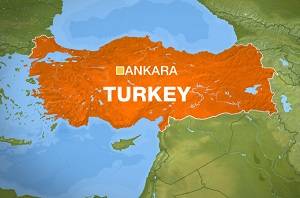At least 34 people have been killed and 125 more wounded after a car bomb struck the Turkish capital, Ankara, officials say.
A bomb-laden car exploded on Sunday evening in the centrally located Kizilay neighborhood, near a major transport hub, private broadcaster NTV reported.
Witnesses said the blast set vehicles on fire and heavily damaged several buses. Police cordoned off the area shortly after the explosion.
The explosion, which could be heard several kilometers away, also sent burning debris showering down over an area a few hundred meters from the justice and interior ministries, a top courthouse, and the former office of the prime minister.
"These attacks, which threaten our country's integrity and our nation's unity and solidarity, do not weaken our resolve in fighting terrorism but bolster our determination," President Recep Tayyip Erdogan said in a statement.
"As of now there has been no claim of responsibility," said Al Jazeera's Mohammed Jamjoom, reporting from Istanbul.
"But this is a real concern for Turkey. It happened in the capital and this is the third explosion to have happened" in Ankara since October.
Local broadcasters reported that an Ankara court ordered a ban on access to Facebook, Twitter and other sites in Turkey on Sunday, after images from the car bombing were shared on social media. Several local users reported difficulty in accessing the sites.
Fadi Hakura, a Turkey expert and associate fellow at Chatham House, told Al Jazeera that insecurity was becoming the new normal in the country.
"Insecurity and instability now is the new dynamic in Turkish politics and in society," he said.
"Both of the last two attacks happened before the summit between the EU and Turkey, so I suspect that the group that carried out these attacks was seeking maximum publicity not just inTurkey but in the outside world to make it clear that Turkey is insecure and unstable place."
February bombing
Sunday's attack comes just three weeks after a suicide car bombing in Ankara targeted buses carrying military personnel, killing 29 people.
"We know how and when we will respond," Ahmet Davutoglu, Turkey's prime minister, told Al Jazeera in an interview, referring to the February attack.
"Definitely, those who made this attack against our people, will pay the price, but how and when, we will decide. And when it happens, everybody will see that Turkey can respond [to] any challenges, any attack, against it."
A Kurdish armed group, the Kurdistan Freedom Hawks (TAK), which is an offshoot of the outlawed Kurdistan Workers' Party (PKK), claimed responsibility for that attack. TAK says it split from the PKK.
Sunday's attack also occurred two days after the US embassy issued a security warning about a potential plot to attack Turkish government buildings and housing in Ankara's Bahcelievler neighborhood and asked its citizens to avoid those areas.
Turkey sees the unrest in its largely Kurdish southeast as deeply linked to events in northern Syria, where the Kurdish YPG militia had been seizing territory.
Turkey fears those gains will stir separatist ambitions among its own Kurds and has long argued that the YPG and PKK have close ideological and operational ties.
In its armed campaign in Turkey, the PKK has historically struck directly at the security forces and says that it does not target civilians.
ISIL has carried out at least four bomb attacks on Turkey since June 2015, including a suicide bombing which killed 10 German tourists in central Istanbul in January.
Local fighters have also staged attacks in the country in the past.
PHOTO CAPTION
Map of Turkey locating Ankara
Al-Jazeera


 Home
Home Discover Islam
Discover Islam Quran Recitations
Quran Recitations Lectures
Lectures
 Fatwa
Fatwa Articles
Articles Fiqh
Fiqh E-Books
E-Books Boys & Girls
Boys & Girls  Ramadan
Ramadan Fatwa Audios
Fatwa Audios Month of Mercy
Month of Mercy Women
Women Eed Al- Fitr
Eed Al- Fitr Food Recipes
Food Recipes Videos
Videos

 Prayer Times
Prayer Times












